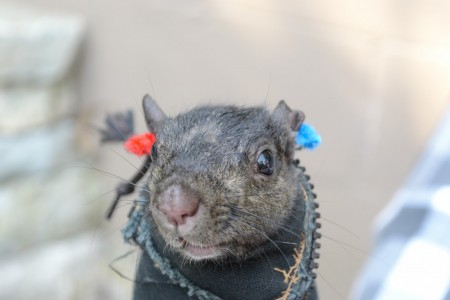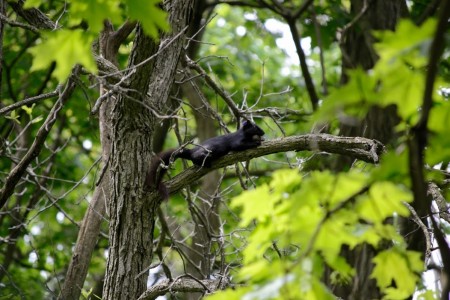
If you live in Guelph, you might have an opportunity to take part in a University of Guelph research project that involves tagging and tracking local squirrels in and around the city.
U of G scientists have launched a new project to combine field and laboratory investigations with citizen science monitoring techniques to study local populations of eastern grey squirrels. Grey squirrels include both black and grey morphs, and many shades in between.
They will trap and sample squirrels and release them with colour-coded ear tags so that individual animals may be identified later from a distance.
“We are asking the community to participate in the project by submitting sightings of squirrels to a paired web/mobile application,” said Mason Stothart, a U of G master’s student who is leading the research as part of his thesis.
“We want to understand the physiological mechanisms that enable wildlife to colonize novel urban landscapes, and in particular the effects of city life on an organism’s stress physiology. We are also interested in probing the effects of urbanization on wildlife health and disease.”
The researchers hope to tag about 200 squirrels, including about 75 on the U of G campus. Tagging will continue throughout the year.
 Stothart said working with the community could provide valuable insight into the squirrels’ behaviour.
Stothart said working with the community could provide valuable insight into the squirrels’ behaviour.
“Having ecological and behavioural data to pair with physiological measures is not always an easy thing to achieve in studies of free-living wildlife,” said Stothart, whose adviser is Prof. Amy Newman, Department of Integrative Biology.
“Citizen science initiatives such as this one could be a powerful tool in bridging this eco-physiological gap in the study of urban wildlife. We know that many city-dwelling organisms, including humans, have higher levels of stress hormones, but do we know the same is true for wildlife?”
Besides tracking specific squirrels, benefits of this project include offering an on-campus learning opportunity for students and teaching the public about the nature and wildlife in the city.
“The City of Guelph is pleased to support this research project as it allows Guelph residents to participate in meaningful research within our parks,” said Martin Neumann, the city’s manager of parks operations and forestry. “The study is also an excellent example of collaboration between the city and U of G.”
Trapping, tagging and tracking are fairly standard procedures in wildlife studies, said Stothart, who was recently awarded a rare Ages Foundation Fellowship.
The annual scholarship is awarded to a graduate student working on the rare Charitable Research Reserve in Cambridge, Ont.
“This fellowship will be of great assistance as we get this study up and running, and in communicating our findings,” said Stothart. “More than that, however, I am looking forward to what I believe will be a productive collaboration with rare.”
For more information about the squirrel project, and to find out how you can get involved, visit citisci.org or email info@citisci.org.